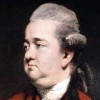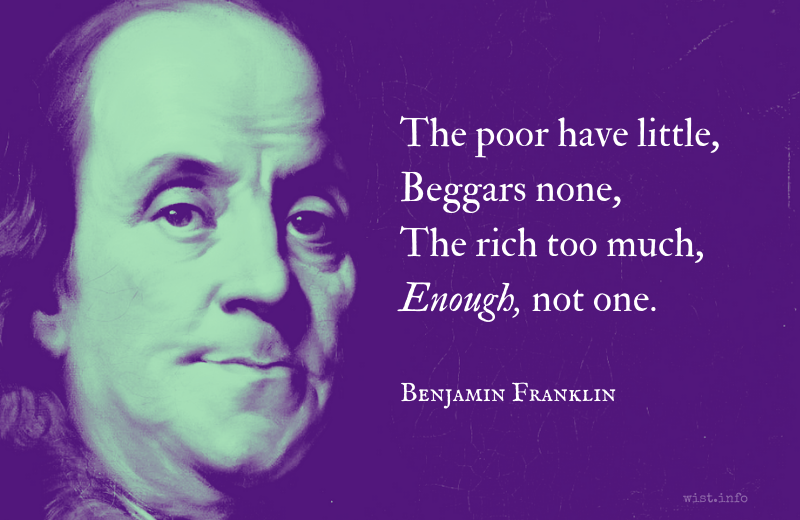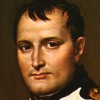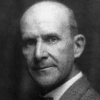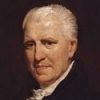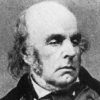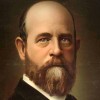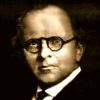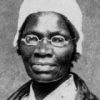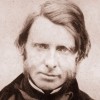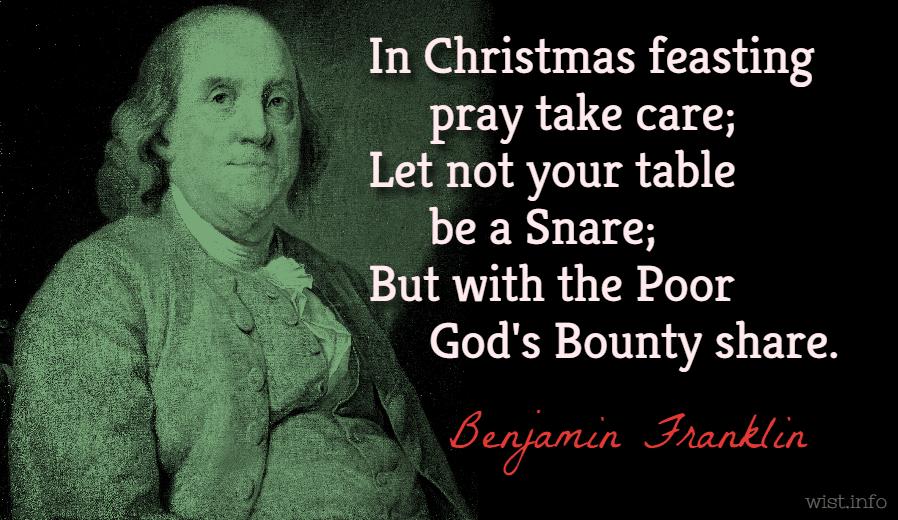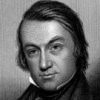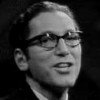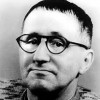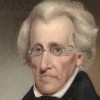He is not poore that hath little, but he that desireth much.
George Herbert (1593-1633) Welsh priest, orator, poet.
Jacula Prudentum, or Outlandish Proverbs, Sentences, &c. (compiler), # 309 (1640 ed.)
(Source)
Quotations about:
poor
Note not all quotations have been tagged, so Search may find additional quotes on this topic.
A fine is a bribe paid by a rich man to escape the lawful penalty of his crime. In China such bribes are paid to the judge personally. In America they are paid to him as agent for the public. But it makes no difference to the men who pay them, nor to the men who can’t pay them.
H. L. Mencken (1880-1956) American writer and journalist [Henry Lewis Mencken]
A Little Book in C Major, ch. 4, § 7 (1916)
(Source)
Variants:
FINE. A bribe paid by a rich man to escape the lawful penalty of his crime. In China such bribes are paid to the judge personally; in America they are paid to him as agent for the public. But it makes no difference to the men who pay them -- nor to the men who can't pay them.
[A Book of Burlesques, "The Jazz Webster" (1924)]
Fine -- A bribe paid by a rich man to escape the lawful penalty of his crime. In China such bribes are paid to the judge personally; in America they are paid to him as agent for the public. But it makes no difference to the men who pay them -- nor to the men who can’t pay them.
[Chrestomathy, ch. 30 "Sententiae" (1949)]
The poor have the same basic pleasures of the rich, and the rich will always resent it.
Mignon McLaughlin (1913-1983) American journalist and author
The Neurotic’s Notebook, ch. 1 (1963)
(Source)
If he is poor who is full of Desires, nothing can equal the Poverty of the Ambitious and the Covetous.
[S’il est vrai que l’on soit pauvre par toutes les choses que l’on désire, l’ambitieux et l’avare languissent dans une extrême pauvreté.]Jean de La Bruyère (1645-1696) French essayist, moralist
The Characters [Les Caractères], ch. 6 “Of Gifts of Fortune [Des Biens de Fortune],” § 49 (6.49) (1688) [Browne ed. (1752)]
(Source)
(Source (French)). Alternate translations:
If he is only poor who desires much, and is always in want; the Ambitious and the Covetous languish in extreme Poverty.
[Bullord ed. (1696)]
If a Man is poor, by all the things which he longs for, the Ambitious and Covetous languish in extreme Poverty.
[Curll ed. (1713)]
If a man be poor who wishes to have everything, then an ambitious and a miserly man languish in extreme poverty.
[tr. Van Laun (1885)]
If it is true that poverty consists in desiring a great many things, the ambitious man and the miser suffer from extreme poverty.
[tr. Stewart (1970)]
It is always easy as well as agreeable for the inferior ranks of mankind to claim merit from the contempt of that pomp and pleasure which fortune has placed beyond their reach. The virtue of the primitive Christians, like that of the first Romans, was very frequently guarded by poverty and ignorance.
Edward Gibbon (1737-1794) English historian
The Decline And Fall of the Roman Empire, Vol. 2, ch. 15 (1781)
(Source)
See La Rochefoucauld.
We know that the poor are distressed by their many wants, and that nobody relieves them; but if the rich feel resentment, it is at lacking any single thing, or meeting with resistance from a single person.
[On sait que les pauvres sont chagrins de ce que tout leur manque, et que personne ne les soulage; mais s’il est vrai que les riches soient colères, c’est de ce que la moindre chose puisse leur manquer, ou que quelqu’un veuille leur résister.]
Jean de La Bruyère (1645-1696) French essayist, moralist
The Characters [Les Caractères], ch. 6 “Of Gifts of Fortune [Des Biens de Fortune],” § 48 (6.48) (1688) [tr. Stewart (1970)]
(Source)
(Source (French)). Alternate translations:
The Poor are troubled that they want all things, and no body comforts them. The Rich are angry that they can want the least thing, or that any one would resist them.
[Bullord ed. (1696)]
The Poor are troubled that they want every thing, and no body comforts them. The Rich are angry that they should want the least thing, or that any one should oppose them.
[Curll ed. (1713)]
The Grief of the Poor is, that they want all Things, and no body comforts them. The Rich are angry if they want the least Thing, is any one contradict or oppose them.
[Browne ed. (1752)]
It is well known that the poor are sad because they want everything and nobody comforts them; but if it be true that the rich are irascible, it is because they may want the smallest thing, or that some one might oppose them.
[tr. Van Laun (1885)]
With tread imperial, impartial pallid Death
knocks at the doors of cottages and palaces. [Pallida mors æquo pulsat pede pauperum tabernas
Regumque turres.]Horace (65-8 BC) Roman poet and satirist [Quintus Horacius Flaccus]
Odes [Carmina], Book 1, # 4, l. 13ff (1.4.13-14) (23 BC) [tr. Alexander (1999), “To Lucius Sestius”]
(Source)
(Source (Latin)). Alternate translations:
Death knocks as boldly at the Rich mans dore
As at the Cottage of the Poore,
[tr. Fanshaw (1666), "To L. Sextius, a Consular Man"]
With equal foot, Rich friend, impartial Fate
Knocks at the Cottage, and the Palace Gate.
[tr. Creech (1684), "He adviseth his Friend to live merrily"]
Pale Death, impartial, walks his round: he knocks at cottage-gate
And palace-portal.
[tr. Conington (1872)]
Pale death knocks at the cottages of the poor, and the palaces of kings, with an impartial foot.
[tr. Smart/Buckley (1853), "To Sextius"]
Death comes alike to all, — to the monarch's lordly hall,
Or the hovel of the beggar, and his summons none shall stay.
[tr. Martin (1864), "To Sestius"]
But all the while, with equal step, pale Death strides on unpausing,
Knocks at thé lowly shed and regal tower.
[tr. Bulwer-Lytton (1870), "To Lucius Sestius"]
Pale death, with impartial step, knocks at the hut of the poor and the towers of kings.
[E.g. (1893)]
The kingly tower alike
And pauper's hut pale Death will strike.
[tr. Gladstone (1894), "To the Rich Sextius"]
Pale Death with foot impartial knocks at poor men's dwellings.
And tow'rs of monarchs.
[tr. Phelps (1897), "To Sestius"]
Pale death with foot impartial strikes at the huts of paupers and
Kings' towers.
[tr. Garnsey (1907), "To Sestius"]
With equal foot pale Pluto knocks at hovels of the poor,
And at the tyrant's towers
[tr. Marshall (1908), "Spring"]
Pale Death with foot impartial knocks at the poor man’s cottage and at princes’ palaces.
[tr. Bennett (Loeb) (1912), "Spring's Lesson"]
Marching with step impartial, Death's pale Presence raps its call
At doors of rich and poor alike.
[tr. Mills (1924)]
Hold! Pale Death, at the poor man's shack and the pasha's palace kicking
Impartially, announces his arrival.
[tr. Michie (1964)]
Death raps his bony knuckles, bleached,
Indifferent, on any man’s door, a palace or a hut.
[tr. Raffel (1983)]
Revenant white-faced Death is walking not knowing whether
He's going to knock at a rich man's door or a poor man's.
[tr. Ferry (1997)]
Pale death knocks with impartial foot, at the door of the poor man’s cottage,
and at the prince’s gate.
[tr. Kline (2015), "Spring"]
A man is rich whose income is larger than his expenses, and he is poor if his expenses are greater than his income.
[Celui-là est riche, qui reçoit plus qu’il ne consume; celui-là est pauvre, dont la dépense excède la recette.]Nicolas Chamfort (1741-1794) French writer, epigrammist (b. Nicolas-Sébastien Roch)
The Characters [Les Caractères], ch. 6 “Of Gifts of Fortune [Des Biens de Fortune],” § 49 (6.49) (1688) [tr. Van Laun (1885)]
(Source)
(Source (French)). Alternate translations:
He is rich whose Receipt is more than his Expences, and he is poor whose Expences are more than his Receipt.
[Bullord ed. (1696)]
He is rich, whose Income is more than his Expences; and he is poor whose Expences are more than his Income.
[Curll ed. (1713)]
He is rich, whose Income is more than his Expences; and he is poor whose Expences exceed his Income.
[Browne ed. (1752)]
That man is rich, who gets more than he spends; that man is poor, whose expenses exceed his receipts.
[tr. Stewart (1970)]
“But whom do I treat unjustly,” you say, “by keeping what is my own?” Tell me, what is your own? What did you bring into this life? From where did you receive it? It is as if someone were to take the first seat in the theater, then bar everyone else from attending, so that one person alone enjoys what is offered for the benefit of all in common — this is what the rich do. They seize common goods before others have the opportunity, then claim them as their own by right of preemption. For if we all took only what was necessary to satisfy our own needs, giving the rest to those who lack, no one would be rich, no one would be poor, and no one would be in need.
[Καὶ ποῖον, λέγει, ἀδικῶ, μὲ τὸ νὰ κρατῶ γιὰ τoν ἐαυτόν μου αὐτὰ ποῦ μου ἀνήκουν; Ποία, εἰπέ μου, εἶναι αὐτὰ ποῦ σου ἀνήκουν; Ἀπὸ ποῦ τὰ ἔλαβες, καὶ τὰ ἔφερες στὴν ζωὴν αὐτήν; Ὅπως ἀκριβῶς κάποιος ποὺ εὑρίσκει στὸ θέατρο θέση μὲ καλὴν θέαν, ἐμποδίζει ἔπειτα τοὺς εἰσερχομένους, θεωρώντας ὡς ἰδικὸ τοῦ αὐτὸ ποὺ προορίζεται γιὰ χρῆσιν κοινήν, ἔτσι εἶναι καὶ οἱ πλούσιοι. Ἀφοῦ ἐκυρίευσαν ἐκ τῶν προτέρων τα κοινὰ ἀγαθά, τὰ ἰδιοποιοῦνται ἁπλῶς ἐπειδὴ τὰ ἐπρόλαβαν. Ἐὰν ὁ καθένας ἐκρατοῦσε ἐκεῖνο ποὺ ἀρκεῖ γιὰ τὴν ἱκανοποίηση τῶν ἀναγκῶν του, καὶ ἄφηνε τὸ περίσσευμα σ’ αὐτὸν ποὺ τὸ χρειάζεται, κανεὶς δὲν θὰ ἦταν πλούσιος, ἀλλὰ καὶ κανεὶς πτωχός.]
Basil of Caesarea (AD 330-378) Christian bishop, theologian, monasticist, Doctor of the Church [Saint Basil the Great, Ἅγιος Βασίλειος ὁ Μέγας]
“I Will Tear Down My Barns [καθελῶ μου τὰς ἀποθήκας],” Sermon # 6 [tr. Schroeder (2009)]
(Source)
In C. Paul Schroeder, ed., Saint Basil on Social Justice (2009).
Sometimes when a person sees the roguery of poor people and the thievery of people in high positions, he is tempted to regard society as a forest full of robbers, the most dangerous of which are the policemen that are set up to stop the others.
[En voyant quelquefois les friponneries des petits et les brigandages des hommes en place, on est tenté de regarder la société comme un bois rempli de voleurs, dont les plus dangereux sont les archers, préposés pour arrêter les autres.]
Nicolas Chamfort (1741-1794) French writer, epigrammist (b. Nicolas-Sébastien Roch)
Products of Perfected Civilization [Produits de la Civilisation Perfectionée], Part 1 “Maxims and Thoughts [Maximes et Pensées],” ch. 3, ¶ 198 (1795) [tr. Siniscalchi (1994)]
(Source)
(Source (French)). Alternate translations:
Seeing the rogueries of little men and the extortions of the great in office, one is tempted to look upon Society as a wood infested by robbers, the most dangerous being the constables sent to arrest the others.
[tr. Mathers (1926)]
At times, seeing the petty thieveries of the petty, and the robberies of those in office, one is tempted to regard society as a wood full of thieves, of which the most dangerous are the officers set there to arrest the others.
[tr. Merwin (1969)]
Sometimes, when one observes the rogueries perpetuated by petty people and the graft committed by men in office, one is tempted to think of society as a wood infested by thieves, of which the most dangerous are the archers, posted to prevent the others from escaping.
[tr. Pearson (1973)]
There are times when, seeing the nasty tricks people get up to, the gross frauds of high officers, you're tempted to think that you're in a wood infested by thieves, amongst whom the most dangerous are the police, whose purpose is supposed to be that of arresting them.
[tr. Parmée (2003), ¶ 152]
The great question for our time is, how to make sure that the continuing scientific revolution brings benefits to everybody rather than widening the gap between rich and poor. To lift up poor countries, and poor people in rich countries, from poverty, to give them a chance of a decent life, technology is not enough. Technology must be guided and driven by ethics if it is to do more than provide new toys for the rich.
Freeman Dyson (1923-2020) English-American theoretical physicist, mathematician, futurist
“Progress in Religion,” Templeton Prize acceptance speech, Washington National Cathedral (9 May 2000)
(Source)
‘Tis unbecoming not to shed a tear
Over the wretched; he too is devoid
Of virtue, who abounds in wealth, yet scruples
Thro’ sordid avarice to relieve their wants.Euripides (485?-406? BC) Greek tragic dramatist
Antiope [Αντιοπη], frag. (c. 410 BC) [tr. Wodhall (1809)]
(Source)
Barnes frag. 62, Musgrave frag. 40.
OLD LADY: Our content
Is our best having.William Shakespeare (1564-1616) English dramatist and poet
Henry VIII, Act 2, sc. 3, l. 27ff (2.3.27-28) (1613)
(Source)
For the old notions of civil liberty and social order did not benefit the masses of the people. Wealth increased, without relieving their wants. The progress of knowledge left them in abject ignorance. Religion flourished, but failed to reach them. Society, whose laws were made by the upper class alone, announced that the best thing for the poor is not to be born, and the next best, to die in childhood, and suffered them to live in misery and crime and pain. As surely as the long reign of the rich has been employed in promoting the accumulation of wealth, the advent of the poor to power will be followed by schemes for diffusing it. Seeing how little was done by the wisdom of former times for education and public health, for insurance, association, and savings, for the protection of labour against the law of self-interest, and how much has been accomplished in this generation, there is reason in the fixed belief that a great change was needed, and that democracy has not striven in vain.
John Dalberg, Lord Acton (1834-1902) British historian
“Review of Sir Erskine May’s Democracy in Europe,” The Quarterly Review (Jan 1878)
(Source)
A society which reverences the attainment of riches as the supreme felicity will naturally be disposed to regard the poor as damned in the next world, if only to justify making their life a hell in this.
R. H. Tawney (1880-1962) English writer, economist, historian, social critic [Richard Henry Tawney]
Religion and the Rise of Capitalism, ch. 4: The Puritan Movement, sec. 4 “The New Medicine for Poverty” (1926)
(Source)
Originally delivered as Holland Lectures, Kings College (Feb-Mar 1922).
Perhaps indeed the possession of wealth is constantly distressing,
But I should be quite willing to assume every curse of wealth if I could at the same time assume every blessing.
The only incurable troubles of the rich are the troubles that money can’t cure,
Which is a kind of trouble that is even more troublesome if you are poor.
Certainly there are lots of things in life that money won’t buy, but it’s very funny —
Have you ever tried to buy them without money?
Ogden Nash (1902-1971) American poet
“The Terrible People,” New Yorker (11 Feb 1933)
(Source)
Reprinted in Many Long Years Ago (1945).
A rich man cannot enjoy a sound mind nor a sound body without exercise and abstinence; and yet these are truly the worst ingredients of poverty.
Henry Home, Lord Kames (1696-1782) Scottish jurist, agriculturalist, philosopher, writer
Introduction to the Art of Thinking, ch. 2 (1761)
(Source)
Jesus Christ chose to be born of poor and humble parents, in a land remote from the centre of political or intellectual influence, and in the circle of labouring men. He chose to belong to the class of the respectable artisan, and most of the twelve Apostles came from the same social level. In His teaching He plainly associated blessedness with the lot of poverty, and extreme danger with the lot of wealth. All through the New Testament the assumption is that God is on the side of the poor against the rich. As Jowett once said, there is more in the New Testament against being rich, and in favour of being poor, than we like to recognise.
William Ralph Inge (1860-1954) English prelate [Dean Inge]
“Bishop Gore and the Church of England,” Edinburgh Review (Jan 1908)
(Source)
Reprinted in Outspoken Essays: First Series (1911).
I do not see in religion the mystery of the incarnation, but the mystery of the social order; religion attaches to heaven an idea of equality that stops the rich from being massacred by the poor.
[Quant à moi, je ne vois pas dans la religion le mystère de l’incarnation, mais le mystère de l’ordre social; elle rattache au ciel une idée d’égalité qui empêche que le riche ne soit massacré par le pauvre.]
Napoleon Bonaparte (1769-1821) French emperor, military leader
Statement (4 Mar 1806)
(Source)
Quoted in Opinions de Napoléon sur divers sujets de politique et d'administration, recueillies par un membre de son conseil d'état (1833).
You have oppressed the poor and robbed them of their grain. And so you will not live in the fine stone houses you build or drink wine from the beautiful vineyards you plant. I know how terrible your sins are and how many crimes you have committed. You persecute good people, take bribes, and prevent the poor from getting justice in the courts. And so, keeping quiet in such evil times is the smart thing to do! Make it your aim to do what is right, not what is evil, so that you may live. Then the Lord God Almighty really will be with you, as you claim he is.
The Bible (The Old Testament) (14th - 2nd C BC) Judeo-Christian sacred scripture [Tanakh, Hebrew Bible], incl. the Apocrypha (Deuterocanonicals)
Amos 5:11-14 [GNT (1976)]
(Source)
Alternate translations:
Forasmuch therefore as your treading is upon the poor, and ye take from him burdens of wheat: ye have built houses of hewn stone, but ye shall not dwell in them; ye have planted pleasant vineyards, but ye shall not drink wine of them. For I know your manifold transgressions and your mighty sins: they afflict the just, they take a bribe, and they turn aside the poor in the gate from their right. Therefore the prudent shall keep silence in that time; for it is an evil time. Seek good, and not evil, that ye may live: and so the Lord, the God of hosts, shall be with you, as ye have spoken.
[KJV (1611)]
Well then, since you have trampled on the poor man, extorting levies on his wheat -- those houses you have built of dressed stone, you will never live in them; and those precious vineyards you have planted, you will never drink their wine. For I know that your crimes are many, and your sins enormous: persecutors of the virtuous, blackmailers, turning away the needy at the city gate. No wonder the prudent man keeps silent, the times are so evil. Seek good and not evil so that you may live, and that Yahweh, God of Sabaoth, may really be with you as you claim he is.
[JB (1966)]
Therefore because you trample on the poor and take from them levies of grain, you have built houses of hewn stone, but you shall not live in them; you have planted pleasant vineyards, but you shall not drink their wine. For I know how many are your transgressions, and how great are your sins -- you who afflict the righteous, who take a bribe, and push aside the needy in the gate. Therefore the prudent will keep silent in such a time; for it is an evil time. Seek good and not evil, that you may live; and so the Lord, the God of hosts, will be with you, just as you have said.
[NRSV (1989 ed.)]
Assuredly,
Because you impose a tax on the poor
And exact from them a levy of grain,
You have built houses of hewn stone,
But you shall not live in them;
You have planted delightful vineyards,
But shall not drink their wine.
For I have noted how many are your crimes,
And how countless your sins --
You enemies of the righteous,
You takers of bribes,
You who subvert in the gate
The cause of the needy!
Assuredly,
At such a time the prudent keep silent,
For it is an evil time.
Seek good and not evil,
That you may live,
And that the ETERNAL, the God of Hosts,
May truly be with you,
As you think.
[RJPS (2006)]
How long will you judge unjustly
and show partiality to the wicked? Selah
Give justice to the weak and the orphan;
maintain the right of the lowly and the destitute.
Rescue the weak and the needy;
deliver them from the hand of the wicked.The Bible (The Old Testament) (14th - 2nd C BC) Judeo-Christian sacred scripture [Tanakh, Hebrew Bible], incl. the Apocrypha (Deuterocanonicals)
Psalm 82:2-4 [NRSV (2021 ed.)]
(Source)
Alternate translations:
How long will ye judge unjustly, and accept the persons of the wicked? Selah.
Defend the poor and fatherless: do justice to the afflicted and needy.
Deliver the poor and needy: rid them out of the hand of the wicked.
[KJV (1611)]
No more mockery of justice,
no more favouring the wicked! Pause
Let the weak and the orphan have justice,
be fair to the wretched and destitute;
rescue the weak and needy,
save them from the clutches of the wicked!
[JB (1966)]
You must stop judging unjustly;
you must no longer be partial to the wicked!
Defend the rights of the poor and the orphans;
be fair to the needy and the helpless.
Rescue them from the power of evil people.
[GNT (1976)]
How much longer will you give unjust judgements and uphold the prestige of the wicked? Pause
Let the weak and the orphan have justice, be fair to the wretched and the destitute.
Rescue the weak and the needy, save them from the clutches of the wicked.
[NJB (1985)]
How long will you judge unjustly
by granting favor to the wicked? Selah
Give justice to the lowly and the orphan;
maintain the right of the poor and the destitute!
Rescue the lowly and the needy.
Deliver them from the power of the wicked!
[CEB (2011)]
How long will you judge perversely,
showing favor to the wicked? Selah.
Judge the wretched and the orphan,
vindicate the lowly and the poor,
rescue the wretched and the needy;
save them from the hand of the wicked.
[RJPS (2023 ed.)]
So long as there shall exist, by virtue of law and custom, decrees of damnation pronounced by society, artificially creating hells amid the civilization of earth, and adding the element of human fate to divine destiny; so long as the three great problems of the century — the degradation of man through pauperism, the corruption of woman through hunger, the crippling of children through lack of light — are unsolved; so long as social asphyxia is possible in any part of the world; — in other words, and with a still wider significance, so long as ignorance and poverty exist on earth, books of the nature of Les Misérables cannot fail to be of use.
[Tant qu’il existera, par le fait des lois et des mœurs, une damnation sociale créant artificiellement, en pleine civilisation, des enfers, et compliquant d’une fatalité humaine la destinée qui est divine; tant que les trois problèmes du siècle, la dégradation de l’homme par le prolétariat, la déchéance de la femme par la faim, l’atrophie de l’enfant par la nuit, ne seront pas résolus; tant que, dans de certaines régions, l’asphyxie sociale sera possible; en d’autres termes, et à un point de vue plus étendu encore, tant qu’il y aura sur la terre ignorance et misère, des livres de la nature de celui-ci pourront ne pas être inutiles.]
Victor Hugo (1802-1885) French writer
Les Misérables, Preface (1862) [tr. Hapgood (1887)]
(Source)
(Source (French)). Alternate translations:
So long as there shall exist, by reason of law and custom, a social condemnation, which, in the face of civilization, artificially creates hells on earth, and complicates a destiny that is divine, with human fatality; so long as the three problems of the age -- the degradation of man by poverty, the ruin of woman by starvation, and the dwarfing of childhood by physical and spiritual night -- are not solved; so long as, in certain regions, social asphyxia shall be possible ; in other words, and from a yet more extended point of view, so long as ignorance and misery remain on earth, books like this cannot be useless.
[tr. Wilbour (1862)]
As long as there shall exist, as a consequence of laws and customs, a social damnation artificially creating hells in the midst of civilization, and complicating the destiny which is divine with a fatality which is human; as long as the three problems of the age -- the degradation of man by the proletariat, the ruin of woman by hunger, the atrophy of the child by the night—are not solved; as long as in certain regions social asphyxia shall be possible; in other terms, and from a still more extended point of view, as long as there shall be on the earth ignorance and wretchedness, books of the nature of this one cannot be useless.
[tr. Wraxall (1862)]
While through the working of laws and customs there continues to exist a condition of social condemnation which artificially creates a human hell within civilization, and complicates with human fatality a destiny that is divine; while the three great problems of this century, the degradation of man in the proletariat, the subjection of women through hunger, the atrophy of the child by darkness, continue unresolved; while in some regions social asphyxia remains possible; in other words, and in still wider terms, while ignorance and poverty persist on earth, books such as this cannot fail to be of value.
[tr. Denny (1976)]
So long as there shall exist, by reason of law and custom, a social condemnation which, in the midst of civilization, artificially creates a hell on earth, and complicates with human fatality a destiny that is divine; so long as the three problems of the century -- the degradation of man by the exploitation of his labor, the ruin of woman by starvation, and the atrophy of childhood by physical and spiritual night -- are not solved; so long as, in certain regions, social asphyxia shall be possible; in other words, and, from a still broader point of view, so long as ignorance and misery remain on earth, there should be a need for books such as this.
[tr. Wilbour/Fahnestock/MacAfee (1987)]
As long as through the workings of laws and customs there exists a. damnation-by-society artificially creating hells int he very midst of civilization and complicating destiny, which is divine, with a man-made fate; as long as the three problems of the age are not resolved: the debasement of of men through proletarianization, the moral degradation of women through hunger, and the blighting of children by keeping them in darkness; as long as in certain strata social suffocation is possible; in other words and from an even broader perspective, as long as there are ignorance and poverty on earth, books of this kind may serve some purpose.
[tr. Donougher (2013)]
Negroes are not the only poor in the nation. There are nearly twice as many white poor as Negro, and therefore the struggle against poverty is not involved solely with color or racial discrimination but with elementary economic justice.
Martin Luther King, Jr. (1929-1968) American clergyman, civil rights leader, social activist, preacher
Speech to Shop Stewards, Local 815, Teamsters and the Allied Trades Council, New York City (2 May 1967)
(Source)
Speak out on behalf of the voiceless,
and for the rights of all who are vulnerable.
Speak out in order to judge with righteousness
and to defend the needy and the poor.The Bible (The Old Testament) (14th - 2nd C BC) Judeo-Christian sacred scripture [Tanakh, Hebrew Bible], incl. the Apocrypha (Deuterocanonicals)
Proverbs 31:8-9 [CEB (2011)]
(Source)
From the sayings of King Lemuel of Massa, given by his mother. Alternate translations:
Open thy mouth for the dumb in the cause of all such as are appointed to destruction. Open thy mouth, judge righteously, and plead the cause of the poor and needy.
[KJV (1611)]
Speak, yourself, on behalf of the dumb, on behalf of all the unwanted; speak, yourself, pronounce a just verdict, uphold the rights of the poor, of the needy.
[JB (1966)]
Speak up for people who cannot speak for themselves. Protect the rights of all who are helpless. Speak for them and be a righteous judge. Protect the rights of the poor and needy.
[GNT (1976)]
Make your views heard, on behalf of the dumb, on behalf of all the unwanted; make your views heard, pronounce an upright verdict, defend the cause of the poor and the wretched.
[NJB (1985)]
Speak out for those who cannot speak,
for the rights of all the destitute.
Speak out; judge righteously;
defend the rights of the poor and needy.
[NRSV (2021 ed.)]
Speak up for the dumb,
For the rights of all the unfortunate.
Speak up, judge righteously,
Champion the poor and the needy.
[RJPS (2023 ed.)]
Experience declares that man is the only animal which devours its own kind; for I can apply no milder term to the governments of Europe, and to the general prey of the rich upon the poor.
Thomas Jefferson (1743-1826) American political philosopher, polymath, statesman, US President (1801-09)
Letter (1787-01-16) to Edward Carrington
(Source)
Your Honor, years ago I recognized my kinship with all living beings, and I made up my mind then that I was not one bit better than the meanest on earth. I said then, and I say now, that while there is a lower class, I am in it; and while there is a criminal element, I am of it; and while there is a soul in prison, I am not free.
Eugene V. Debs (1855-1926) American union leader, activist, socialist, politician
Statement to the Court (1918-09-18)
(Source)
On being convicted of sedition for urging resistance to the draft. Often paraphrased:
As long as there is a lower class, I am in it. As long as there is a criminal element, I am of it. As long as there is a soul in prison, I am not free.
Good government is known from bad government by this infallible test: that under the former the labouring people are well fed and well clothed, and under the latter, they are badly fed and badly clothed.
William Cobbett (1763-1835) English politician, agriculturist, journalist, pamphleteer
Cobbett’s Political Register, Vol. 46 (31 May 1823)
(Source)
The murmuring poor, who will not fast in peace.
George Crabbe (1754-1832) English poet, writer, surgeon, clergyman
“The Newspaper,” l. 158 (1785)
(Source)
Where Plenty smiles — alas! she smiles for few,
And those who taste not, yet behold her store,
Are as the slaves that dig the golden ore,
The wealth around them makes them doubly poor.George Crabbe (1754-1832) English poet, writer, surgeon, clergyman
The Village, Book 1, line 136 (1783)
(Source)
The King in a carriage may ride,
And the Beggar may crawl at his side;
But in the general race,
They are traveling all the same pace.Edward FitzGerald (1809-1883) English writer, poet, translator
“Chronomoros,” l. 57ff, Chambers’s Edinburgh Journal (5 Dec 1840)
(Source)
The poverty of goods is easily cured; the poverty of the soul is irreparable.
Michel de Montaigne (1533-1592) French essayist
Essays, Book 3, ch. 10 “Of Managing the Will” (1588) [tr. Cotton (1877)]
(Source)
Alt. trans.: "Poverty of possessions may easily be cured, but poverty of soul never."
“I hope that you did not give him anything, Mr Sanderson!”
“Of course I did, ma’am.”
“But he would only spend it on drink! You know what the working classes are!”
“Indeed, ma’am, and why should he not spend it on drink? Would you deprive the poor, whose lives are bad and miserable and comfortless enough, of the solace of a little relief from grinding poverty? A sordid, sodden relief perhaps, but would you be so heartless as to deny the poor even that pleasure in which all of us indulge at your generous expense?”
What has destroyed every previous civilization has been the tendency to the unequal distribution of wealth and power. This same tendency, operating with increasing force, is observable in our civilization to-day, showing itself in every progressive community, and with greater intensity the more progressive the community. Wages and interest tend constantly to fall, rent to rise, the rich to become very much richer, the poor to become more helpless and hopeless, and the middle class to be swept away.
You cannot bring about prosperity by discouraging thrift.
You cannot help small men by tearing down big men.
You cannot strengthen the weak by weakening the strong.
You cannot lift the wage earner by pulling down the wage payer.
You cannot help the poor man by destroying the rich.
You cannot keep out of trouble by spending more than your income.
You cannot further the brotherhood of man by inciting class hatred.
You cannot establish security on borrowed money.
You cannot build character and courage by taking away men’s initiative and independence.
You cannot help men permanently by doing for them what they could and should do for themselves.William J. H. Boetcker (1873-1962) German-American religious leader, author, public speaker [William John Henry Boetcker]
“The Industrial Decalogue” (1916)
Often referred to as "The Ten Cannots," and also often misattributed to Abraham Lincoln.
Yet somehow our society must make it right and possible for old people not to fear the young or be deserted by them, for the test of a civilization is the way that it cares for its helpless members.
By fixing men’s minds, not upon the discharge of social obligations, which restricts their energy, because it defines the goal to which it should be directed, but upon the exercise of the right to pursue their own self-interest, it offers unlimited scope for the acquisition of riches, and therefore gives free play to one of the most powerful of human instincts. To the strong it promises unfettered freedom for the exercise of their strength; to the weak the hope that they too one day may be strong. Before the eyes of both it suspends a golden prize, which not all can attain, but for which each may strive, the enchanting vision of infinite expansion. It assures men that there are no ends other than their ends, no law other than their desires, no limit other than that which they think advisable. Thus it makes the individual the center of his own universe, and dissolves moral principles into a choice of expediences.
R. H. Tawney (1880-1962) English writer, economist, historian, social critic [Richard Henry Tawney]
The Acquisitive Century, ch. 3 “The Acquisitive Society” (1920)
(Source)
Economic privation proceeds by easy stages, and so long as men suffer it patiently the outside world cares little.
John Maynard Keynes (1883-1946) English economist
The Economic Consequences of the Peace, ch. 6 (1919)
(Source)
When the rich rob the poor it’s called business. When the poor fight back it’s called violence.
Mark Twain (1835-1910) American writer [pseud. of Samuel Clemens]
(Spurious)
Frequently, but incorrectly attributed to Twain, no earlier than 2015. It appears to have been an anonymous phrase coined in the Occupy Movement in 2011. See here for more information.
[The] “robbing of the poor because he is poor,” is especially the mercantile form of theft, consisting in taking advantage of a man’s necessities in order to obtain his labor or property at a reduced price. The ordinary highwayman’s opposite form of robbery — of the rich, because he is rich — does not appear to occur so often to the old merchant’s mind; probably because, being less profitable and more dangerous than the robbery of the poor, it is rarely practice by persons of discretion.
In Christmas feasting pray take care;
Let not your table be a Snare;
But with the Poor God’s Bounty share.
Benjamin Franklin (1706-1790) American statesman, scientist, philosopher, aphorist
Poor Richard’s Almanack, December (1748)
(Source)
Laws for the liberal education of youth, especially of the lower class of people, are so extremely wise and useful, that, to a humane and generous mind, no expense for this purpose would be thought extravagant.
John Adams (1735-1826) American lawyer, Founding Father, statesman, US President (1797-1801)
“Thoughts on Government” (Apr 1776)
(Source)
He who walks through a great city to find subjects for weeping, may, God knows, find plenty at every corner to wring his heart; but let such a man walk on his course, and enjoy his grief alone — we are not of those who would accompany him. The miseries of us poor earthdwellers gain no alleviation from the sympathy of those who merely hunt them out to be pathetic over them. The weeping philosopher too often impairs his eyesight by his woe, and becomes unable from his tears to see the remedies for the evils which he deplores. Thus it will often be found that the man of no tears is the truest philanthropist, as he is the best physician who wears a cheerful face, even in the worst of cases.
One of the temptations of upper-middle class life is to create sharp edges of our moral sensitivities that allows comfortable confusions about sin and virtue. The difference between rich and poor is not that the rich sin more than the poor, it is that the rich find it easier to call sin a virtue. When the poor sin, they call it sin; when they see holiness, they identify it as such. This intuitive clarity is often absent from the wealthy, and that absence easily leads to the atrophy of the moral sense.
POLLY PEACHUM: The law is simply and solely made for the exploitation of those who do not understand it or of those who, for naked need, cannot obey it.
There is a crime here that goes beyond denunciation. There is a sorrow here that weeping cannot symbolize. There is a failure here that topples all our success. The fertile earth, the straight tree rows, the sturdy trunks, and the ripe fruit. And children dying of pellagra must die because a profit cannot be taken from an orange. And coroners must fill in the certificate — died of malnutrition — because the food must rot, must be forced to rot.
In the eyes of the people there is the failure; and in the eyes of the hungry there is a growing wrath. In the souls of the people the grapes of wrath are filling and growing heavy, growing heavy for the vintage.
Public services have, to use the economist’s word, a strong redistributional effect. And this effect is strongly in favor of those with lower incomes. Those who clamor the loudest for public economy are those for whom public services do the least. Tax reduction that curtails or limits public services has a double effect in comforting the comfortable and afflicting the poor.
John Kenneth Galbraith (1908-2006) Canadian-American economist, diplomat, author
“Wealth and Poverty,” Speech, National Policy Committee on Pockets of Poverty (13 Dec 1963)
See sourcing notes here.





